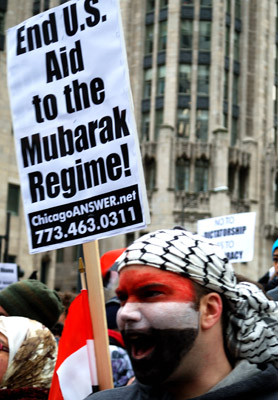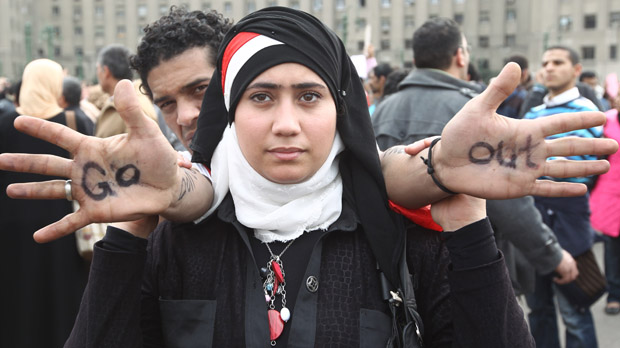Egypt crisis: the secret American game plan?
When Obama spoke to Mubarak, what exactly did he say? Channel 4 News examines America’s game plan in Egypt as Sarah Smith plots a timeline of the US President’s biggest foreign policy test yet.

The change must happen immediately but Egypt‘s fate rests with the Egyptian people, Barack Obama declared last night – finally.
But when the pair spoke last night, what did President Obama urge Hosni Mubarak to do?
White House officials say Obama is guided by two core principles: outlined, neatly enough, in the speech he gave in Cairo in 2009: on the one hand, promoting universal, democratic rights – on the other trying not to dictate the outcome from outside – as he put it, back then: “no system of government can or should be imposed by one nation on any other.”
It is the key lesson Obama learned from the Iraq war – democracy must come from within. For too long, the United States has picked and chosen the dictators it wants to support – and closed its eyes to human rights abuses under those it’s propped up as strategic allies.
Of course, America has to take its national interests into account – not least, the overwhelming desire to avoid a dangerous and uncertain slide into instability in Egypt and beyond. The worst case scenario? What happened to Jimmy Carter and the Shah of Iran back in 1979: first shoring him up, then calling for democratic reform – then, after he fled, seeing an Islamic regime installed in his place, that was never going to be any friend of the US.
So more than thirty years on, the White House first tried its best to keep its distance, dispatching former diplomat Frank Wisner to Cairo at the weekend to try to persuade President Mubarak to step aside.
But, as the New York Times has made clear, he had no obvious message to deliver and any preconcieved plans were quickly overhwelmed by the sheer pace of what was happening on the Egyptian streets. The International Crisis Group‘s Middle east director Robert Malley told the paper “in a matter of days, every assumption about the United States relationship with Egypt was upended.”
The administration’s top national security and Middle East experts hastily gathered on Saturday to work out a strategy, conceding that Mubarak’s time was over, and coming up with the key phrase “an orderly transition”. It was, in effect, tantamount to abandoning their old ally, without making it look as if they were directly pushing him out.
In public, the priority became all about avoiding any kind of violent upheaval – for that way, chaos lies.
Hence the incredibly nuanced language – calling for change “now” – but without being prescriptive on whether that meant Mubarak should resign immediately, as protesters were demanding, or stay until September to somehow manage the transfer of power.
'Obama's big foreign policy test'
When President Obama appeared on American TV sets just before 7pm on Tuesday he talked about "difficult days ahead". And he wasn't just talking about difficult days in Egypt.
The last few days inside the White House have been the biggest foreign policy test this president has yet faced. As every time the administration had settled on a policy it was immediately overtaken by events on the ground.
More from Washington Correspondent Sarah Smith

And hence the careful praise for the Egyptian army – on Tuesday Obama singling out the “professionalism and patriotism that it has shown” in allowing peaceful protests to take place, while respecting the rights of the people.
Meanwhile the leading GOP senator Lindsay Graham told reporters the US had a direct strategic interest at stake:”Every American should be very appreciative of the fact that for years we were providing aid to the Egyptian army in terms of equipment and training because that army is our ace in the hole to make sure Egypt doesn’t go into a radical state,” adding that any interim regime would need the support of the military as well as the people.
Just as crucially, the White House is trying to sort out its position on the powerful Muslim Brotherhood.
Just as crucially, the White House is trying to sort out its position on the powerful Muslim Brotherhood – aware that simply ignoring it could fatally undermine US credibility in the region. You had to read between the lines of what White House spokesman Robert Gibbs said, but the message was implicit – engagement with the Brotherhood is not being ruled out. Pragmatic, certainly, realistic, undoubtedly – but it’s already worrying Israelis and their supporters. The former US ambassador to Israel and Egypt, Daniel Kurtzer just one of the voices warning against the inclusion of an “organised extremist Islamic opposition” in Cairo’s future government.
Regime change is by its very nature a highly uncertain variable: an Egypt under Hosni Mubarak has served US interests in the Middle East for decades. Can they be protected without him? And there’s the future of peace talks between Israel and Palestine, such as they are, which could be in serious jeopardy.
As Donald Rumsfeld might have put it – there are too many of those “unknown unknowns”. And that’s why Obama’s strategy is proving quite so difficult to shape.
Felicity Spector is a chief sub-editor with Channel 4 News.